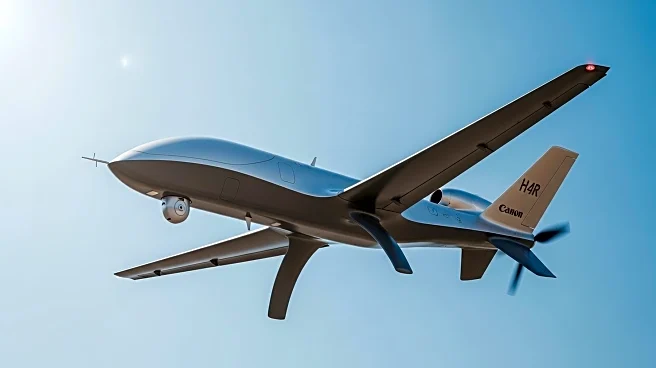What's Happening?
Sikorsky, a Lockheed Martin company, is advancing its Nomad family of hybrid-electric vertical-takeoff-and-landing uncrewed aircraft systems (UAS). The Nomad series is designed to replace the U.S. Army's Textron RQ-7 Shadow in brigade-level reconnaissance missions. The Nomad UAS, which includes Group 3 and Group 4 versions, is intended for intelligence, surveillance, reconnaissance, and targeting missions. The Nomad 100, a hybrid-electric Group 3 UAS, is currently undergoing testing under DARPA's Evade program. The Nomad family also aims to serve civil missions such as wildfire suppression and humanitarian aid. The UAS features modular design and uses Sikorsky's Matrix autonomy system, allowing operation by soldiers without aviation training.
Why It's Important?
The development of the Nomad UAS represents a significant shift in military reconnaissance capabilities, offering enhanced range and payload through hybrid-electric propulsion. This advancement could lead to more efficient and versatile operations in both military and civil sectors. The modularity and autonomy of the Nomad system may reduce operational costs and increase accessibility for non-specialized personnel. The transition from Textron's RQ-7 Shadow to Sikorsky's Nomad could impact defense contractors and influence future military procurement strategies.
What's Next?
Sikorsky plans to continue testing and development of the Nomad UAS, with potential decisions on flying a demonstrator for the Group 4 UAS in the next year or two. The company is also working on the HEX hybrid-electric demonstrator, which shares control laws with the Nomad. As the Nomad family progresses, it may see increased adoption in both military and civil applications, potentially leading to new contracts and partnerships.
Beyond the Headlines
The introduction of hybrid-electric UAS like the Nomad could drive innovation in sustainable aviation technologies, influencing future designs and operational strategies. The use of autonomy systems may also raise discussions on the ethical implications of unmanned operations in military contexts.










